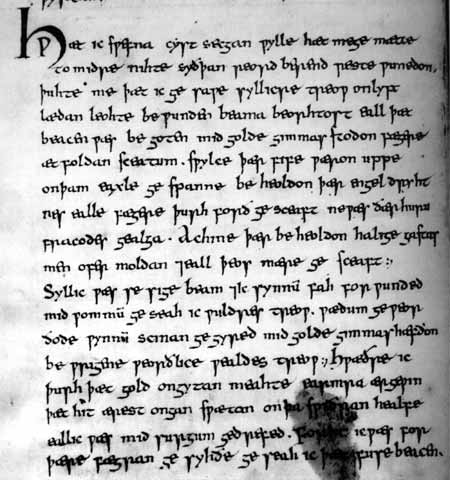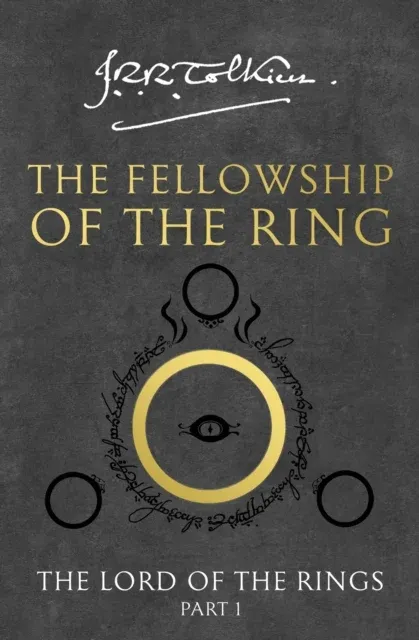Notes on "The Dream of the Rood"

"The Dream of the Rood" describes Christ's death from the viewpoint of the cross. It describes Him as a mighty, courageous warrior, winning a significant battle.
Text:
Listen! The choicest of visions I wish to tell,
which came as a dream in middle-night,
after voice-bearers lay at rest.
It seemed that I saw a most wondrous tree
born aloft, wound round by light,
brightest of beams. All was that beacon
sprinkled with gold. Gems stood
fair at earth’s corners; there likewise five
shone on the shoulder-span. All there beheld the Angel of God,
fair through predestiny. Indeed, that was no wicked one’s gallows,
but holy souls beheld it there,
men over earth, and all this great creation.
Wondrous that victory-beam – and I stained with sins,
with wounds of disgrace. I saw glory’s tree
honored with trappings, shining with joys,
decked with gold; gems had
wrapped that forest tree worthily round.
Yet through that gold I clearly perceived
old strife of wretches, when first it began
to bleed on its right side. With sorrows most troubled,
I feared that fair sight. I saw that doom-beacon
turn trappings and hews: sometimes with water wet,
drenched with blood’s going; sometimes with jewels decked.
But lying there long while, I,
troubled, beheld the Healer’s tree,
until I heard its fair voice.
Then best wood spoke these words:
---(speaker changes from poet to "rood" or cross)---
“It was long since – I yet remember it –
that I was hewn at holt’s end,
moved from my stem. Strong fiends seized me there,
worked me for spectacle; cursèd ones lifted me.
On shoulders men bore me there, then fixed me on hill;
fiends enough fastened me. Then saw I mankind’s Lord
come with great courage when he would mount on me.
Then dared I not against the Lord’s word
bend or break, when I saw earth’s
fields shake. All fiends
I could have felled, but I stood fast.
The young hero stripped himself – he, God Almighty –
strong and stout-minded. He mounted high gallows,
bold before many, when he would loose mankind.
I shook when that Man clasped me. I dared, still, not bow to earth,
fall to earth’s fields, but had to stand fast.
Rood was I reared. I lifted a mighty King,
Lord of the heavens, dared not to bend.
With dark nails they drove me through: on me those sores are seen,
open malice-wounds. I dared not scathe anyone.
They mocked us both, we two together. All wet with blood I was,
poured out from that Man’s side, after ghost he gave up.
Much have I born on that hill
of fierce fate. I saw the God of hosts
harshly stretched out. Darknesses had
wound round with clouds the corpse of the Wielder,
bright radiance; a shadow went forth,
dark under heaven. All creation wept,
King’s fall lamented. Christ was on rood.
But there eager ones came from afar
to that noble one. I beheld all that.
Sore was I with sorrows distressed, yet I bent to men’s hands,
with great zeal willing. They took there Almighty God,
lifted him from that grim torment. Those warriors abandoned me
standing all blood-drenched, all wounded with arrows.
They laid there the limb-weary one, stood at his body’s head;
beheld they there heaven’s Lord, and he himself rested there,
worn from that great strife. Then they worked him an earth-house,
men in the slayer’s sight carved it from bright stone,
set in it the Wielder of Victories. Then they sang him a sorrow-song,
sad in the eventide, when they would go again
with grief from that great Lord. He rested there, with small company.
But we there lamenting a good while
stood in our places after the warrior’s cry
went up. Corpse grew cold,
fair life-dwelling. Then someone felled us
all to the earth. That was a dreadful fate!
Deep in a pit one delved us. Yet there Lord’s thanes,
friends, learned of me,. . . . . . . . . . .
adorned me with silver and gold.
Now you may know, loved man of mine,
what I, work of baleful ones, have endured
of sore sorrows. Now has the time come
when they will honor me far and wide,
men over earth, and all this great creation,
will pray for themselves to this beacon. On me God’s son
suffered awhile. Therefore I, glorious now,
rise under heaven, and I may heal
any of those who will reverence me.
Once I became hardest of torments,
most loathly to men, before I for them,
voice-bearers, life’s right way opened.
Indeed, Glory’s Prince, Heaven’s Protector,
honored me, then, over holm-wood.
Thus he his mother, Mary herself,
Almighty God, for all men,
also has honored over all woman-kind.
Now I command you, loved man of mine,
that you this seeing tell unto men;
discover with words that it is glory’s beam
which Almighty God suffered upon
for all mankind’s manifold sins
and for the ancient ill-deeds of Adam.
Death he tasted there, yet God rose again
by his great might, a help unto men.
He then rose to heaven. Again sets out hither
into this Middle-Earth, seeking mankind
on Doomsday, the Lord himself,
Almighty God, and with him his angels,
when he will deem – he holds power of doom –
everyone here as he will have earned
for himself earlier in this brief life.
Nor may there be any unafraid
for the words that the Wielder speaks.
He asks before multitudes where that one is
who for God’s name would gladly taste
bitter death, as before he on beam did.
And they then are afraid, and few think
what they can to Christ’s question answer.
Nor need there then any be most afraid
who ere in his breast bears finest of beacons;
but through that rood shall each soul
from the earth-way enter the kingdom,
who with the Wielder thinks yet to dwell.”
I prayed then to that beam with blithe mind,
great zeal, where I alone was
with small company. My heart was
impelled on the forth-way, waited for in each
longing-while. For me now life’s hope:
that I may seek that victory-beam
alone more often than all men,
honor it well. My desire for that
is much in mind, and my hope of protection
reverts to the rood. I have not now many
strong friends on this earth; they forth hence
have departed from world’s joys, have sought themselves glory’s King;
they live now in heaven with the High-Father,
dwell still in glory, and I for myself expect
each of my days the time when the Lord’s rood,
which I here on earth formerly saw,
from this loaned life will fetch me away
and bring me then where is much bliss,
joy in the heavens, where the Lord’s folk
is seated at feast, where is bliss everlasting;
and set me then where I after may
dwell in glory, well with those saints
delights to enjoy. May he be friend to me
who here on earth earlier died
on that gallows-tree for mankind’s sins.
He loosed us and life gave,
a heavenly home. Hope was renewed
with glory and gladness to those who there burning endured.
That Son was victory-fast in that great venture,
with might and good-speed, when he with many,
vast host of souls, came to God’s kingdom,
One-Wielder Almighty: bliss to the angels
and all the saints – those who in heaven
dwelt long in glory – when their Wielder came,
Almighty God, where his homeland was.
This poem is mainly about Jesus Christ, who is referred to as the "Angel of God", the "Healer", "mankind's Lord", etc. It elaborates on the death of Jesus on the cross and how, instead of losing the battle against sin with His death, He was victorious against it.
The mood of this poem is victorious and awed, as the speaker witnesses the victory of Jesus over the sins of the world.
Kenning is also used in this poem, as well as metaphor. "He mounted high gallows,". This is an epic poem, and is the earliest written dream poem, which is when a poem is about a dream that the poet had.




